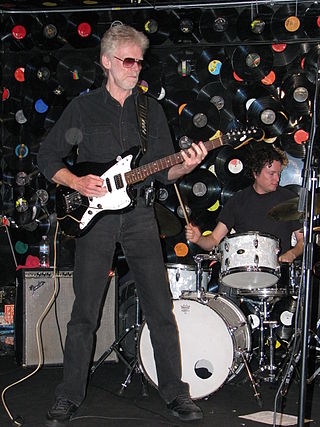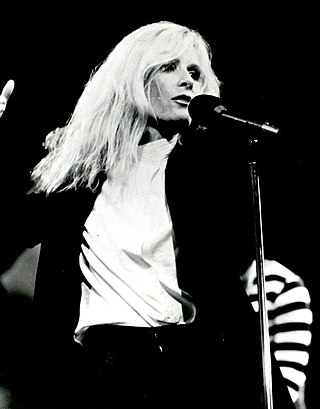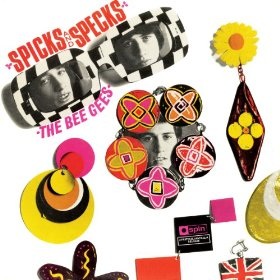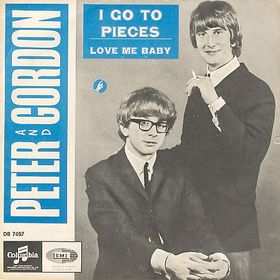Related Research Articles

Davie Allan is an American guitarist best known for his work on soundtracks to various teen and biker movies in the 1960s. Allan's backing band is almost always the Arrows, although the Arrows have never had a stable lineup.

Cucumber Castle is the seventh studio album by the Bee Gees, released in April 1970. It was produced by Barry Gibb, Maurice Gibb, and Robert Stigwood. It consists of songs from their television special of the same name, which was named after a song on their 1967 album Bee Gees' 1st. Cucumber Castle is the only Bee Gees album not to feature any recorded contributions from Robin Gibb, as he had left the group before the album was recorded.

Kim Carnes is an American singer and songwriter born and raised in Los Angeles. She began her career as a songwriter in the 1960s, writing for other artists while performing in local clubs and working as a session background singer with the famed Water Sisters. After she signed her first publishing deal with Jimmy Bowen, she released her debut album Rest on Me in 1971. Carnes' self-titled second album primarily contained self-penned songs, including her first charting single "You're a Part of Me", which reached No. 35 on the Billboard Adult Contemporary chart in 1975. In the following year, Carnes released Sailin', which featured "Love Comes from Unexpected Places". The song won the American Song Festival and the award for Best Composition at the Tokyo Song Festival in 1976.
Stephen Alan Kipner is an American-born Australian songwriter and record producer, with hits spanning a 40-year period, including chart-topping songs such as Olivia Newton-John's "Physical", Natasha Bedingfield's "These Words", and Christina Aguilera's "Genie in a Bottle", for which he won an Ivor Novello Award for International Hit of the Year. Other hits he has writing credits on include Chicago's "Hard Habit to Break", 98 Degrees' "The Hardest Thing", Dream's "He Loves U Not", Kelly Rowland's "Stole", The Script's "Breakeven" and "The Man Who Can't Be Moved", American Idol Kris Allen's top 5 debut "Live Like We're Dying", Cheryl Cole's "Fight for This Love", Camila Cabello's "Crying in the Club" and James Arthur's "Say You Won't Let Go".

Tin Tin was a pop rock band, which first formed in Australia as The Kinetics in 1966. They relocated to the United Kingdom in 1969 and were renamed as Tin Tin, which comprised Steve Kipner, Steve Groves, John Vallins and Geoff Bridgford (drums). In 1970 they issued a single, "Toast and Marmalade for Tea", which was a No. 10 hit on the Go-Set National Singles Chart in June the following year. It reached No. 20 in the United States on the Billboard Hot 100. Their next single, "Is That the Way?" (1971), peaked at No. 59 on the Billboard Hot 100.

Russell Norman Morris is an Australian singer-songwriter and guitarist who had five Australian Top 10 singles during the late 1960s and early 1970s. On 1 July 2008, the Australian Recording Industry Association (ARIA) recognised Morris' status when he was inducted into the ARIA Hall of Fame.
Player is a British-American rock band that was formed in the late 1970s. The group scored several US Hot 100 hits, three of which went into the top 40; two of those single releases went top 10, including the No. 1 hit "Baby Come Back", written by group members Peter Beckett and J.C. Crowley.

Beeb Birtles is an Australian musician, singer, songwriter and guitarist. He has been a member of various Australian groups including Zoot (1967–71), Mississippi (1972–74), Little River Band (1975–83) and Birtles Shorrock Goble (2002–07). He has also worked as a solo artist, including releasing an album, Driven by Dreams (2000). In 2004, Birtles and other members of the classic line-up of Little River Band were inducted into the ARIA Hall of Fame.

Terence Ernest Britten is an English-Australian singer-songwriter and record producer, who has written songs for Tina Turner, Cliff Richard, Olivia Newton-John, Status Quo and Michael Jackson amongst many others. Britten won the Grammy Award for Song of the Year in 1985 for "What's Love Got to Do with It".

Spicks and Specks is the second studio album by the Bee Gees. It was released in November 1966, on Spin. Primarily written by Barry Gibb, the album includes the first Robin Gibb composition "I Don't Know Why I Bother With Myself" and a Maurice Gibb composition "Where Are You".
Zoot were a pop rock band formed in Adelaide, South Australia, in 1964 as Down the Line. They changed their name to Zoot in 1967 and by 1968 had relocated to Melbourne. They had a top-five hit on the Go-Set national singles chart with a heavy rock cover of The Beatles' ballad "Eleanor Rigby" released in 1970, but they disbanded in May 1971.
Device was a short-lived American pop-rock trio from the mid 1980s, formed by keyboardist, bassist and vocalist Holly Knight. It also included frontman Paul Engemann and guitarist Gene Black.

Darryl Grant Cotton was an Australian pop, rock singer-songwriter, television presenter and actor. He was a founding member of Australian rock group Zoot in 1965, with Beeb Birtles, and were later joined by Rick Brewer and Rick Springfield. As a solo artist Cotton released the albums, Best Seat in the House (1980), It's Rock 'n' Good Fun (1984) and Let the Children Sing (1994). In April 1980 his biggest solo hit, "Same Old Girl", which was co-written by Cotton, peaked at No. 6 on the Australian Kent Music Report Singles Chart. He acted in the TV soap opera, The Young Doctors (1979), and on stage as Joseph in the theatre production of Joseph and the Amazing Technicolour Dreamcoat (1983). He presented TV shows, Summer Rock and The Early Bird Show. In 1996 he formed Burns Cotton & Morris with fellow 1960s pop singers, Ronnie Burns and Russell Morris. In 2000 Burns retired from the trio and, with Jim Keays, they became Cotton Keays & Morris. In May 2012, Cotton was diagnosed with liver cancer and died on 27 July 2012, aged 62.

"Toast and Marmalade for Tea" is a song by the Australian rock group Tin Tin, and was written by Steve Groves and produced by Maurice Gibb. It was a Top 20 U.S. hit in 1971.
Sunshine Records was an Australian independent pop music record label of the mid-1960s. It was established in late 1964 by promoter Ivan Dayman in collaboration with musician-producer-arranger-songwriter Pat Aulton and entrepreneur, producer and songwriter Nat Kipner. Although his enterprise was short-lived, Dayman was arguably the first Australian popular music entrepreneur to create a fully integrated pop music company that included artist management and bookings, record production, record labels, venue management and concert promotion.
Cotton Keays & Morris was an Australian rock band formed in 2000 consisting of singer-songwriters Darryl Cotton, Jim Keays and Russell Morris. Each wrote and recorded numerous hit songs since the 1960s. The band toured Australia regularly, their stage show featuring the hits of each member and their previous groups.

"I Go to Pieces" is a song written by Del Shannon which became a Top Ten hit for Peter and Gordon on 20 February 1965. The duo's fourth single, it was their first not to be written by John Lennon and Paul McCartney.
John Vallins is an Australian Gold and Platinum award winning songwriter/musician best known for his 1970s song "Too Much, Too Little, Too Late".
Michael Jeffrey Lloyd is an American record producer, arranger, songwriter and musician. After working with Mike Curb, Kim Fowley and others in the mid-to-late 1960s on musical projects including the West Coast Pop Art Experimental Band, and Steven Spielberg's first short film, Amblin', he became a producer of such teen idol pop stars as the Osmonds, Shaun Cassidy and Leif Garrett in the 1970s.
Burns Cotton & Morris was an Australian rock band formed in 1996 consisting of singer-songwriters Ronnie Burns, Darryl Cotton and Russell Morris. Each wrote and recorded numerous hit singles in the 1960s and 70s in Australia. The band toured Australia and released a self-titled album in 1996, which was a compilation of their individual hits as well as three new tracks. Two additional albums were released by the trio, Hear and Now in 1997 and Three in 1998.
References
- ↑ Friends, Discogs.com. Retrieved 6 February 2015
- ↑ "Cotton, Lloyd & Christian". Allmusic. Rovi Corporation . Retrieved 3 August 2012.
- ↑ Whitburn, Joel (2003). Top Pop Singles 1955-2002 (1st ed.). Menomonee Falls, Wisconsin: Record Research Inc. p. 130. ISBN 0-89820-155-1.
- ↑ McFarlane, Encyclopedia entry for "'Zoot'". Archived from the original on August 9, 2004. Retrieved July 10, 2019.. Retrieved 21 January 2010.
- ↑ Cotton, Lloyd & Christian, Discogs.com. Retrieved 6 February 2015